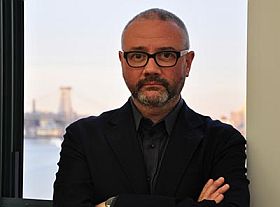Respect! All right, we can get no official support due to the economical crisis, but we will make the festival anyway. We will finance it out of own pocket. This was the thought of a group of independent Russian filmmakers, who stand behind the MIDFF DOKer that starts May 22 and runs until May 26. 16 features will take part in the Main Competition and 19 films in the Shorts Competition. 10 films have been selected for this year’s Special programme Cinema in Cinema.
Some background taken from the site: DOKer is a project of screening independent documentaries, it was created in the beginning of 2011 by a group of enthusiasts to promote contemporary art documentaries in Moscow and other Russian cities. It has enjoyed 9 seasons in 6 cities. Altogether, 300 screenings have been staged for more than 20,000 viewers
The project doesn’t limit itself to screenings, it also organizes discussions with the filmmakers, master classes, closed screenings before the world premieres, regular social and cultural surveys of the audiences, campaigns to attract media attention to new Russian films, lengthy partnerships with various film festivals and organizations, assistance and support of local theatrical releases and many other activities…
The filmmakers who organize the festival have been working on selection since autumn. They received 1325 submissions from 97 countries and have selected films from 5 continents and 31 countries. All foreign films are Russian premieres, some being world/international as well.
Criteria for selection: “1) In a word combination “documentary movie” stress falls on a “movie”. 2) There are millions ways to make a documentary, but one thing should stay permanent: it should be dramatic and interesting. 3) An image and a sound are important for docs as much as for fiction. A language of cinema consists of sounds and images, just this language tell us stories. If it is poor, no one will appreciate it.”
Cultural aim: The Festival organizers are convinced that films about real characters from all over the world can break down old stereotypes and bring together people of polar mentalities. Finely-told documentary stories can help find ways of understanding another culture and establish common ground when realities clash. Such films can also help bring closer aspirations and hopes of other people and even find the meaning of life..
I e-mailed Irina Shatalova, one of the initiators, who explained what the further plan is:
… We’ve decided to launch a crowdfunding campaign in Russia, which will last before, during and all the summer after the Festival with the aim of organizing a special Festival-weekend in September, to present once again the winner-films of the Festival and bring all their authors for discussions after the screenings and to arrange once again some kind of the special solemn ceremony. 🙂
This is another non-standard step, but it’ll give us the opportunity to support this initiative for a longer time and to focus on it the attention of the public, the media and possible future partners. We believe that this event in autumn can be a beautiful point, signifying a preparation for the next Festival’s edition.
The DOKer Team, besides me is (I’m sure you are familiar with most of these people))): director Nastia Tarasova (Shatalova and Tarasova made “Linar”, director Sergei Kachkin (“On the Way Home”), director Igor Morozov, super high level linguist Aliona Cheporova, director Tatiana Soboleva (“The Floating Hospital”). Producer Maria Chuprinskaya, journalist Giuliano Vivaldi and several other people also greatly help us with the organization of the Festival.
I also hasten to inform you that all members of the jury finally confirmed their participation. Here they are: film director Victor Kossakovsky, cinematographer from Poland Mateusz Skalski (his work on ‘A Dream in the Making’ won him best cinematography award on 53rd Krakow Film Festiwal) and film critic from Greece Vassilis Economou, and you Tue…
The jury, which works from their homes and discuss via online, is to give the following awards:
– Best Documentary Feature
– Best Directing
– Best Cinematography
– Best Editing
– Best Sound
To award these professional achievements is very important for us as for organisers, because these skills are not often stand out as a separate professional merits. So we decided that it is fair…
Indeed it is and far too often forgotten are the cameramen, the editors, the sound engineers.
Russian filmmakers with a global vision and repertory, a passion for the documentary genre as an art form and what it can do, and a respect for the audience.
http://www.midff.com/#!home/mainPage
trailer: https://vimeo.com/126994575



